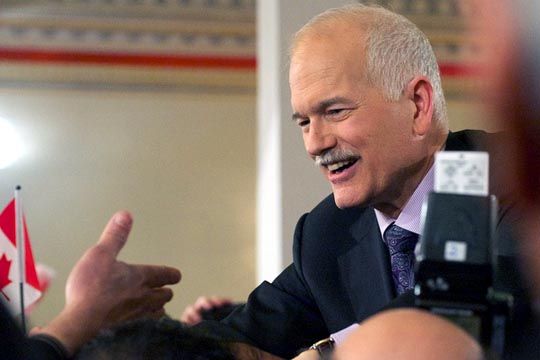Almost everyone I’ve talked to since what seemed like the sudden announcement of Jack Layton’s death had the same experience that I did. It hit me harder than I expected. I’ve lost other comrades, many closer than Jack was to my politics and my practice but his death hit me harder. I’ve been thinking about why.
Maybe it was because we all believed with him that he could beat the cancer. And it seemed so cruel that just at the moment of his greatest triumph, it took his life. Such an archetypal tragedy. It might have left us in despair except for his amazing open letter to us.
“My friends, love is better than anger. Hope is better than fear. Optimism is better than despair. So let us be loving, hopeful and optimistic. And we’ll change the world.”
Yesterday, at the memorial in Toronto, a young man started rapping those words ending with “the change starts today.”
The letter was so like Jack but it was the part addressed to cancer patients that took my breath away. His first thought was his responsibility as a public figure. He was dying of cancer but he didn’t want that to discourage others who were struggling with the disease. How generous can a person be? In knowing his life was almost over, still he thought of others, not just loved ones but all the ones he didn’t know but that he might influence because they knew him.
Jack was a rare politician whose driving force was not ego but his passion for social justice and his compassion for people. His famous love of the microphone, I believe, was about wanting to be heard not so much to be seen.
It was also Jack’s spirit. He was always so positive, so enthusiastic, so loving. Even when I disagreed with him, which was pretty frequently over the last few years, he always accepted my disagreements with love. I don’t know what else to call it. When I quit the party a couple of years ago over my disagreement with their support for Harper’s law-and-order agenda, he accepted my decision with equanimity. He understood that this was a principle for me and never thought of it as betrayal. He still loved me as a comrade and a friend. In this Jack was extraordinary.
And then there is the comrade Jack. When I think of the battles I’ve fought in my life, Jack was always there. He was as much an activist as he was a politician. He stood up for what he believed in, not worrying so much whether it would win him votes or not. I think I first met him on the picket line in front of the Morgentaler clinic where supporters would come to protect patients from the anti-choice gauntlet. He was a young city counselor then but he didn’t hesitate to take a stand on an issue that meant a lot to him even though the clinic was still illegal.
And it was true on so many issues and for so many constituencies. You all know the list by now. He so thoroughly believed in a more equal society that he put his body where his mouth was time and time again.
I got to know him when he nominated me for provincial party president of the Ontario NDP in 1988. I was running as part of the group called Campaign for an Activist Party (CAP). The NDP leadership was determined to defeat us so nominating me was a career-limiting move. He didn’t hesitate.
When he ran for leader, a lot of people who supported the New Politics Initiative, which I helped to found, supported him, like Libby Davies and Svend Robinson. I stood aside because we wanted to remain independent from the party. I also wasn’t sure that Jack necessarily supported our political vision for the party. Even if he did, I doubted it would be possible for the party to change without a bigger shake-up.
He didn’t do what I wanted him to do with the party but he did something perhaps more important, something I think will create an even bigger shake up, something I wouldn’t have believed possible. He won Quebec. His win in Quebec was such a monumental shift in Canadian politics that it is still difficult to understand it. For me, it was Quebecois saying to the people of English Canada. “We’ll give you another chance. We can work together on issues like unemployment, healthcare, education, war and getting rid of Mr. Harper. On those things we have common interests.” Jack understood that sovereignty is one issue on which we might disagree but that it is not the only important issue. By uniting on the other issues, whatever Quebec decides about sovereignty, Canada will be a stronger, and fairer country. What a breakthrough for the Left, the most important in my lifetime, I believe.
I didn’t thank Jack personally for that, but when he appointed Nycole Turmel as interim leader and the media descended on her like a pack of dogs, the people of Canada said no. It’s a good thing if someone decides to give a federalist party a chance. The people of Canada refused to be polarized against the people of Quebec as they have often been by the political elite. And that gives me hope.
So thank you, Jack. Thank you for showing us what working from a place of love means. Thanks for giving us a role model of a good politician who stands up for what he believes in and truly represents the people who elected him. Thank you for showing us that a difference of opinion is not about whether you are a good person or not. And thank you for showing so many people that politics is not a dirty word and maybe just maybe we can build a better world even without you.



